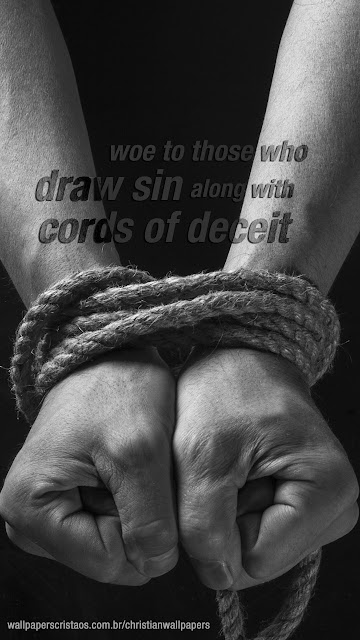"Woe unto them that draw iniquity with cords of vanity, and sin as it were with a cart rope" (v. 18, KJ).
 "What sorrow for those who drag their sins behind them with ropes made of lies, who drag wickedness behind them like a cart! (v. 18 NLT)
"What sorrow for those who drag their sins behind them with ropes made of lies, who drag wickedness behind them like a cart! (v. 18 NLT)From this Isaiah Bible study commentary:
"They sinned and dared God to punish them. When punishment didn't come immediately, they chose to continue doing evil. Raymond C. Ortlund asks us to "Picture people, not horses, harnessed to a heavy wagon, pulling it along, straining with all their might" Isaiah understands the burden that sin is. But we do it to ourselves. Why? Because sin is deceitful (Hebrews 3:12). This is what is meant by cords of falsehood (v. 18)" -Grace Church Memphis, Isaiah study
"That say, Let him make speed, and hasten his work, that we may see it: and let the counsel of the Holy One of Israel draw nigh and come, that we may know it! Woe unto them that call evil good, and good evil; that put darkness for light, and light for darkness; that put bitter for sweet, and sweet for bitter! Woe unto them that are wise in their own eyes, and prudent in their own sight! (v. 19-21).
Q1. The six woe's of Isaiah 5 are:
1. Woe to those who buy up houses and fields to greedily add to their possessions (v 7-8).
2. Woe to those who over indulge in alcohol (v 12)
3. Woe to those who drag falsehood and sin after them like a cart (v 18-19)
4. Woe to those who call evil good and good evil (blurring morality) (v 20)
5. Woe to those who are proud in their own eyes (v 21)
6. Woe to those who acquit the guilty for a bribe--pervert justice (v 23)
Q2. Do I see myself in any of these woes? I think there is always danger of slipping into pride and fooling ourselves by dragging sin/falsehood behind us instead of trusting God with the upright. In our current culture, it requires vigilant discernment to call good good and evil evil--particularly since moral relativism is the dominant flavor of thought.

No comments:
Post a Comment